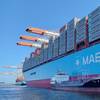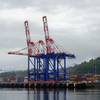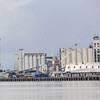Coal has washed up in waters dangerously close to Australia's Great Barrier Reef, environmental authorities said on Wednesday, following an investigation into complaints of black dust on nearby beaches.
Ship-loading facilities at the port of Hay Point, which ships tens of millions of tonnes of coal annually to export markets worldwide, are at the centre of the investigation by authorities in the northeastern state of Queensland.
But it was too early to say if the Hay Point port was the source of the coal and fine dust that washed up on the nearby beaches of East Point and Louisa Creek, the state's environment minister, Steven Miles, told reporters.
"The impact on marine life and the reef is likely to be quite localised," Miles added. "Provided the source can be identified and we can ensure it is not continuing to spill, it is likely to be possible to clean up."
Hay Point is the largest of several coal ports located near the Great Barrier Reef Marine Park and a flashpoint for environmentalists concerned over runoff contamination of the reef, a World Heritage site.
"This is another example of why coal and the Great Barrier Reef don’t mix," said Sam Regester, campaigns director for the activist group GetUp! "We know more ships and more coal equals more accidents."
In December, Australia earmarked expenditure of A$1.3 billion ($992 million) over the next five years to improve the water quality of the reef, to keep it off the United Nation's "in danger" list.
Activists say the money is insufficient and want to see more concrete action to protect the reef.
More than two million people visit the reef each year, generating more than A$2 billion ($1.53 billion) in tourism dollars, an Australian government report showed in 2016.
Reporting by James Regan












